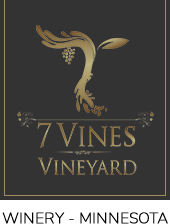Sommeliers: serious about wine
By Debra Neutkens/Editor
A sommelier can detect the most subtle of notes — and not the musical sort. Rather, the note of pineapple or blackberry or peach; perhaps traces of dill one senses on the palate with that first sip of wine.
Hints of those flavors are described in tastings led by sommelier Maureen McKenna as she walks visitors through a tour at 7 Vines Vineyard in Dellwood. McKenna is a wine professional who has spent years honing her taste buds, sampling and studying wines of the world. 7 Vines may be the only vineyard in Minnesota to have a sommelier on staff.
The winery, located on the 188-acre estate once owned by Peter and Gertrude Ffolliott, was purchased in 2010 by Ron and Arlie Peltier. Their daughter, Janee Katz, head of operations, hired McKenna a year ago.
Becoming a sommelier is not easy. There are four levels of accreditation to become a Master Sommelier, aptly described in The New Yorker as “fine wine’s most sacrosanct circle.” McKenna attained the second level, or “certified” sommelier, in the European Court while living in Switzerland. There are two courts, American and European. The requirements are the same.
The Court of Master Sommeliers was established in London in 1969 to encourage improved standards of beverage knowledge and service. Since the court’s inception, only 255 candidates across the globe have passed the Master Sommelier exam, fewer than have traveled to space, one writer noted. The diploma is considered the “ultimate professional credential anyone can attain worldwide” in the wine and spirits industries.
Born in Vermont, McKenna attended college in Boston, earning a master’s degree in international education policy at Harvard. After getting the degree, she wanted to work for a non-governmental organization and landed a job with the Red Cross in Washington, D.C.
“I worked up to director of strategic partnerships, which meant I was managing corporate partnerships with Fortune 500 companies,” McKenna said. As she put together global partnerships with companies like Apple and Disney, she focused more and more on international work, eventually moving to Geneva, Switzerland in, 2015 to work for the international Red Cross to manage branding and corporate communications.
She was always interested in wine. “I dabbled in home winemaking in D.C. and I traveled around to vineyards, tasting and going on tours. I thought I would own a vineyard one day when I retired.”
McKenna’s decision to become a wine expert came when by happenstance, she watched a documentary called “Somm.” Made in 2013, it follows four guys who have passed the advanced level and are preparing to take the extremely difficult Master Sommelier exam, a three-part timed test with a 3 to 8 percent pass rate. Some test takers practice for years before making their first attempt.
“The documentary opened my eyes to realizing what else there is to the wine industry besides being a winemaker,” McKenna recalled. “It was one of those life-changing moments.”
What particularly piqued her interest was “being able to dive into cultures using wine as the vehicle. The history, politics, laws, geology and geography that it takes to make a certain style of wine in a certain region is fascinating,” McKenna said. “There is a story behind every label; where it came from, its culture. It opened my eyes. I thought, ‘I can do this.’”
When her partner was transferred from Switzerland to Minnesota, McKenna reached out to a University of Minnesota horticulturalist who connected her with Bryan Forbes, the winemaker at 7 Vines. She worked with Forbes to learn about Minnesota grapes and vineyard management. “When they learned about my background, they scooped me up,” McKenna said.
What does it take to become a sommelier? “Practice,” she replied. She belongs to two tasting groups, joining other certified sommeliers to practice blind taste tests several times a week.
Her goal is knowledge. “I want to know as much as I can to communicate about wine to any customer who asks. Being at 7 Vines is very cool because I’ve been introduced to these hybrid varietals that I never knew existed before moving to Minnesota.”
Her job is to help customers understand what they might like and what they don’t. “We ask simple questions like, ‘Do you like fruity wine or dry wine?’ The most important part of my job is educating or helping customers understand what varietals are,” McKenna said. “People don’t drink this every day.”
Among her sommelier duties are development of programs such as a Tour and Tasting and a wine group called Club 7 that has grown to more than 80 members. The 60-minute tour and tasting includes wine and food pairings curated by McKenna and an introduction into the winemaking process. Information on the tours and benefits of club membership can be found at 7vinesvineyard.com.
The owners of 7 Vines want customers to feel they are part of the winery, McKenna said. “They want professionalism in a relaxed, inviting atmosphere. And they want people who can make that happen. That’s why they have a sommelier on staff.”
She considers Minnesota an up-and-coming wine region. You never know: area wines may be on the Master Sommelier famously challenging blind taste test someday.
 7 Vines Vineyard Homepage
7 Vines Vineyard Homepage